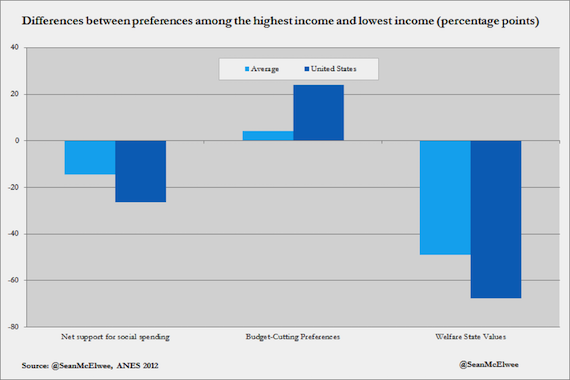Above Photo: Volt Collection via Shutterstock
US leads world with the largest gap between the rich and poor on social spending of any nation
If people ruled social spending would be 40% higher in the US
We already know that American government only responds to the wishes of the few. But what about other nations?
Since the beginnings of democracy, debate has raged as to how responsive politicians are to their constituents. Though such debates stretch back centuries, only recently have academics gotten the ability to use data to test how well legislatures represent the people they ostensibly serve. So far, the evidence hasn’t been kind, with two leading academics arguing recently that, “the preferences of the average American appear to have only a minuscule, near-zero, statistically non-significant impact upon public policy.”
That’s academic for: “American democracy is a joke.”
Much of the academic work, and nearly all of the press coverage of the field, has focused solely on the United States. In a new working paper, a luminary in the field, political scientist Larry Bartels, expands his analysis to explore the relationship between policy and public preferences to the international arena. First, Bartels finds increasing demand for a stronger safety net across in many countries where data stretch back more than two decades, including the United States. (Indeed, support for more social spending has increased the most dramatically in the US). He does so by using a question that asks individuals to indicate where they would like more government spending. (The question notes that tax increases may be necessary to boost government spending.) Although there are eight spending areas in the International Social Survey Programme (ISSP) data, Bartels focuses in on four: pensions, health, unemployment benefits, and education.
While it initially appears that policymakers respond to changes in public preferences, Bartels shows that in fact the changes are endogenous. When Bartels controls for economic growth and unemployment, the apparent relationship between public opinion and public spending is eliminated. (See the dashed line in the figure below.)
Bartels finds massive differences between the rich and poor on preferences for social spending, budget cutting and “welfare state values.” To determine public support for budget cutting, Bartels used a question that asked whether cuts in government spending as “some things the government might do for the economy.” What Bartels refers to as “welfare state values” are these questions: “On the whole, do you think it should or should not be the government’s responsibility to provide a job for everyone who wants one?” and “ “On the whole, do you think it should or should not be the government’s responsibility to reduce income differences between the rich and the poor?”
As the chart shows, the rich are less supportive of social spending, more supportive of budget cuts, and opposed to government guaranteeing jobs and reducing inequality (“welfare state values”).
The United States was a leader in class conflict, with the largest gap between the rich and poor on social spending of any nation, the second highest gap on budget-cutting preferences (only Finland had a greater level of class conflict) and the fourth highest gap on welfare state values (after Netherlands, Sweden and New Zealand). The Nordic countries had among the highest gaps in opinion, suggesting that many of the rich may feel that the country has gone too far to reduce inequality and providing public goods. In only one country, South Korea, were the rich more supportive of higher social spending than the poor. In all countries, the wealthy were less supportive of “welfare state values” than the poor.
When Bartels compared the policy preferences of the rich and poor to actual policy results (with controls) his results were disturbing. He finds that low-income preferences had virtually no effect on policy outcomes.
Source Article from https://www.popularresistance.org/research-rise-of-the-global-imperial-plutocracy/
Related posts:
Views: 0
 RSS Feed
RSS Feed

















 January 26th, 2016
January 26th, 2016  Awake Goy
Awake Goy 



 Posted in
Posted in  Tags:
Tags: 
















